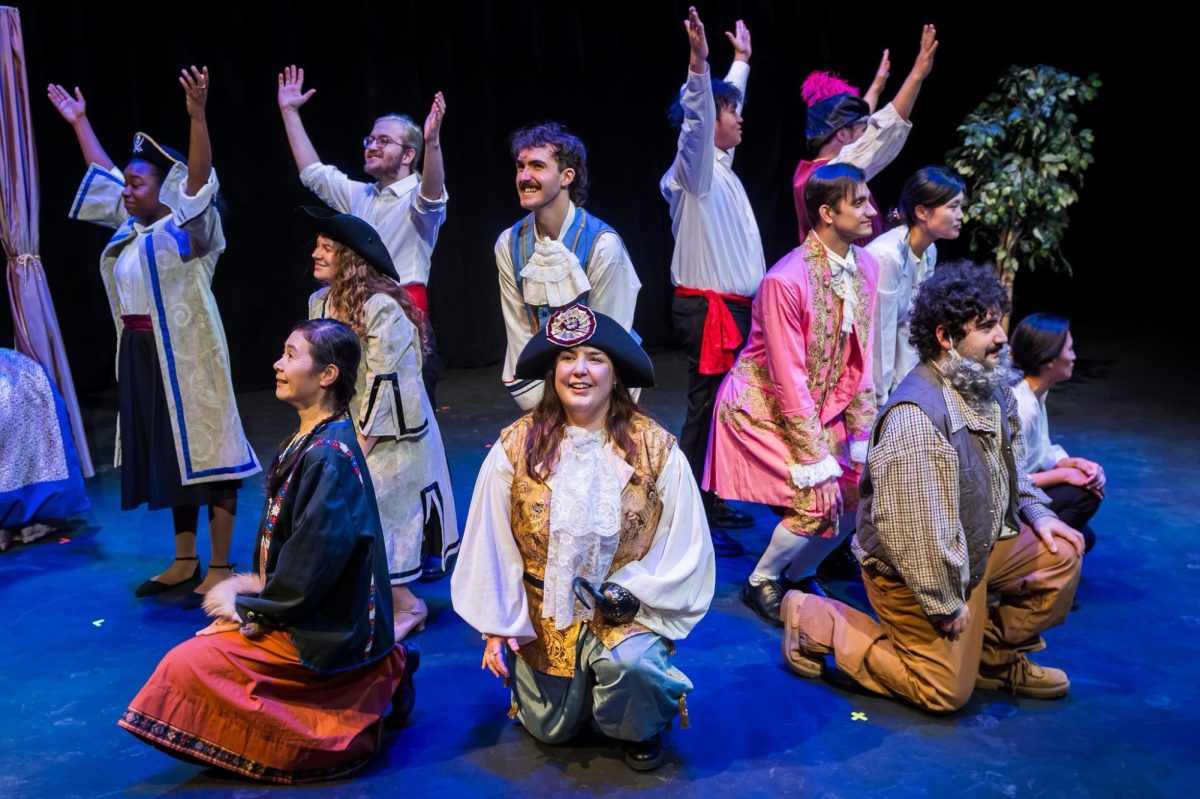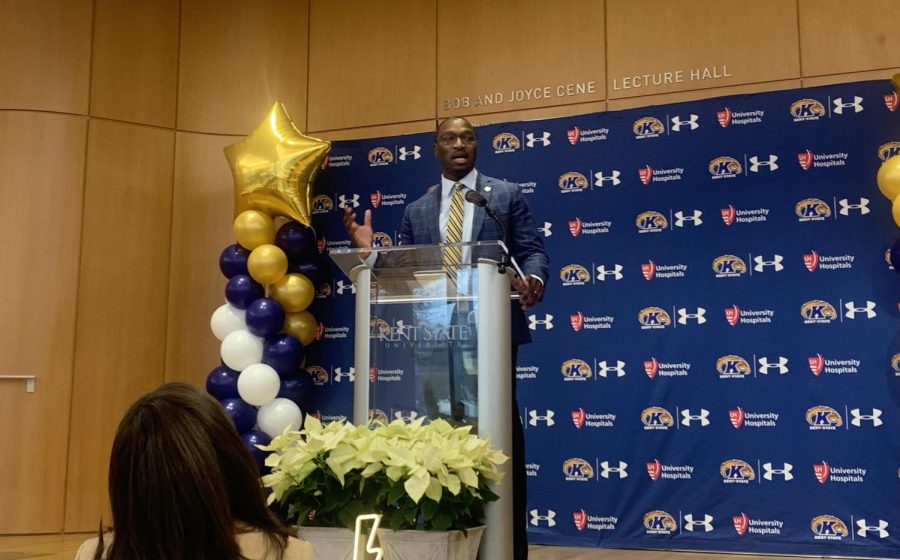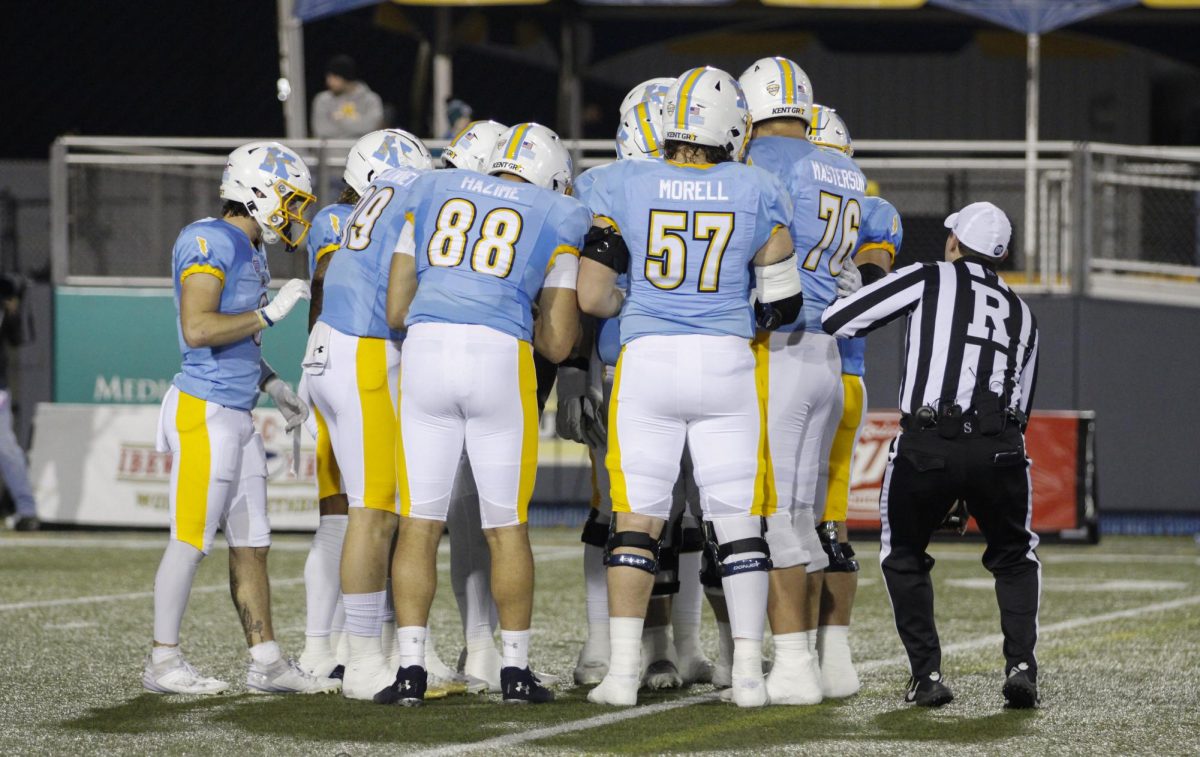David Hogg, a survivor of the 2018 Parkland shooting that claimed the lives of 17 people, spoke about the parallels between May 4 and Parkland, his own journey of activism and the importance of advocacy on college campuses Thursday.
The gun control activist and co-founder of March For Our Lives visited the university’s KIVA theater in an event sponsored by the May 4 Task Force.
Hogg, who was a senior in high school at the time of the shooting, has since dedicated his career to activism. He, along with other survivors of the Parkland shooting, founded March For Our Lives, a youth-led movement dedicated to ending gun violence in 2018, just weeks after the event.
In the weeks and months that followed Parkland, hundreds of thousands of people marched at the United States Capitol and in other states around the country, demanding stricter gun laws. Tens of thousands of high school, middle school and elementary students protested the government’s lack of action in response to gun violence in some of the largest student-walkouts in U.S. history.
Hogg’s journey
In his speech, Hogg talked about his own journey of activism that began after the Parkland shooting.
“When the shooting happened at my high school, it was one of those times where the students could, as has often happened, stayed back, done nothing and expected that the government would do the right thing, because it should,” Hogg said. “But unfortunately, because of the experience of growing up as young people in America, we have failed time and time and time again.”
Hogg referenced unaffordable college tuition, failure to act on climate change and gun control as ways he and his classmates felt the government had failed them as young Americans.
So, in the weeks following the shooting, on a friend’s living room floor, about 25 teen Parkland survivors decided to try to make change.
“We started boycotting companies that worked with the National Rifle Association and had discounts with them,” he said. “It was something achievable where we could show that Goliath is not as powerful as many people say he is, where we could have one small victory and start making progress there.”
In addition to this, Hogg said the student activists and others who joined the cause began to call sponsors of the National Rifle Association (NRA) to demand they cease partnership with them.
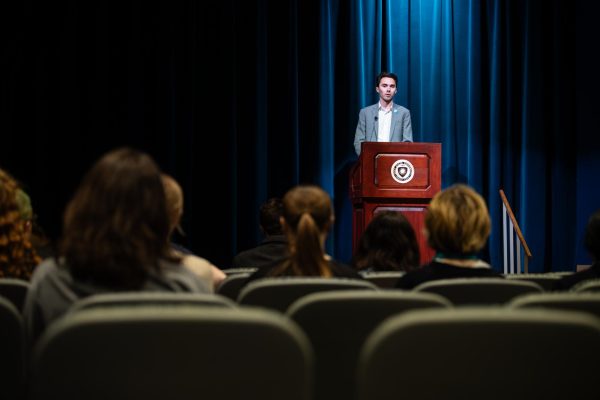
Eventually, corporations like Delta Airlines, United Airlines, Geico and Triple A broke all ties with the gun organization.
After this, the student activists then turned their efforts to organizing walk-outs.
“We were like, ‘You know what we should do next? We should have students walk out of their schools and demand that we walk out of our schools to protest that we aren’t safe in them, either in school or outside of it,’” he said.
March For Our Lives was born in March 2018.
The organization marched in Washington D.C. to the Capitol Building on March 24 of that year, attracting what organizers said was a crowd of 800,000 people. The Washington Post reported between one and two million others protested in 763 different locations across the country.
After the march on Washington, organizers planned a bus tour across the country inspired by the Freedom Rides of the 1960s and grassroots movements of the 1970s, including the protests at Kent State on and before May 4, 1970. The goal of the tour was to speak to students around the country who walked out in the March For Our Lives protests.
“We went to the districts where if young people turned up and voted just 10% more, if we could just get the students who walked out of their high schools to vote, we could vote out more NRA backed incumbents than ever before in American history,” he said. “But the issue of gun violence pertains to more than just violence in schools. To fully address gun violence survivors had to address all sides of it, including communities that have experienced gun violence for decades as well as state-sanctioned police violence.”
The group began their tour in Chicago.
“We wanted to show people not only that we were working with students from the South and West sides of Chicago that experience gun violence every day, but [we were] making sure that we weren’t coming to them and telling them, ‘We’re from Parkland, we know how to solve this issue that you’ve dealt with for decades and we’re here to save you…’” Hogg said. “We know that with the platform we’ve been given, we have a responsibility to share the spotlight that we had. Because if students are safe in Parkland but they’re not safe in Chicago or they’re not safe outside of school in general, we have still failed.”
The day after they left Chicago, they went to Ferguson, Missouri, where in 2014, a white police officer killed an unarmed 18-year-old named Michael Brown. Several witnesses claim Brown had his hands up at the time of the shooting. The killing sparked protests and eventually led to the birth of the Black Lives Matter movement.
“We wanted to acknowledge the fact that not only are school shootings a form of gun violence, but unfortunately as you all know here at Kent State that state violence is also a form of gun violence,” Hogg said. “Especially when it’s used against innocent people.”
Hogg and fellow activists spent that Father’s Day with Michael Brown’s father.
“It was from that that I really began to realize the intricacies of how all these things are connected,” Hogg said. “What happened in Parkland was obviously unacceptable, but what happens every day in America is unacceptable. And it doesn’t matter whether it’s an enraged 19-year-old that’s murdering people in a high school in Parkland, Florida or it’s an innocent young man that’s murdered by police in an extrajudicial killing.”
Hogg, whose father is a former member of law enforcement, said he understands the need for law enforcement in society – but that doesn’t equate to innocent American lives being lost.
More recently, in addition to numerous other activist efforts, Hogg campaigned for his friend and former colleague Maxwell Frost’s race in the U.S. Senate. Frost, who previously served as national organizing director of March For Our Lives, now serves Florida’s 10th congressional district. At 27-years-old, he is the first member of Gen Z to serve in Congress.
Activism on college campuses
In an interview with KentWired before the event, Hogg stressed the issues young people face with organizing today.
Hopelessness is understandable, he said.
“The important thing to note though, is that if we all believed change was impossible, nothing ever would change in the first place,” Hogg said. “It has to start with someone.
“If we can stand up like we did after Parkland and pass gun laws in Florida, pass hundreds of gun laws in places around the country and just recently pass the strongest federal gun law in 30 years that brought the NRA to the weakest place it’s ever been in in modern history and cause it to lose a million members when March For Our Lives has since gained a million members, how can you not feel a sense of hope that comes with that?”
However, hope is not necessary for a movement to succeed and for change to be made, Hogg said.
“Thankfully, young people have the greatest asset that anyone can have on their side in politics,” Hogg said. “Which is that we will outlive everyone that is against us. The question is whether we are going to change the incentive structures that created this system of government and the many failures that young people are experiencing so much of today.”
In order for student activism to succeed, Hogg said, student advocacy groups must get better at calling students in rather than out.
“We have to create an environment where the movement calls people in and works with them to actively be better than one that repels people because people think that they have to be perfect to be part of the movement,” he said. “Because if that’s the case, you’re not going to have a movement for much longer.”
Hogg noted that activist spaces often do the opposite.
“In these movement spaces, we’ve often created very exclusive environments where people feel like if they don’t know everything about a certain theory, if they don’t know everything about gun control, climate change, racial justice, whatever it might be, that they can’t participate,” he said.
He said this is one of the follies of modern activist organization and is often something that makes people who would otherwise be excited to join deterred.
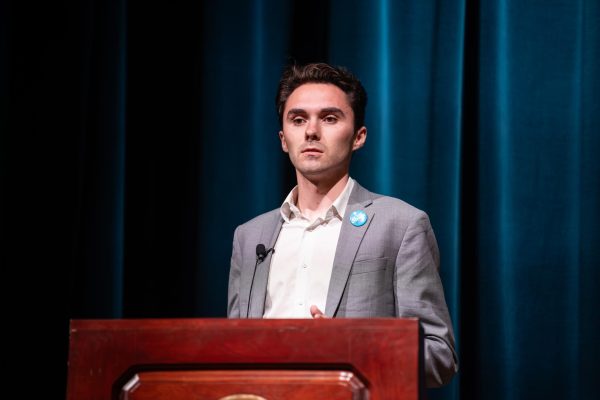
America in 2024
Hogg urged college students to remember that 2024 is not just the year of another presidential election, but rather that change begins on a local level.
“What is going to affect you politically far more than the presidency is your state legislature,” he said.
Issues like gun regulation and reproductive right’s policies come almost exclusively from state legislatures, Hogg said, and that is why voting is so important.
“It’s incredibly important that we still vote because unfortunately, no single person in every election will save us,” he said. “It’s going to take decades of work of building up better leaders and helping to elect people that don’t take corporate money. For example, electing people that stand strongly in promoting gun safety, combating climate change and more.”
Though Hogg and movements like March For Our Lives have made strides in curbing gun violence in the United States, the problem is worsening.
Gun violence has risen in prevalence since 2018. Gun deaths have gone up by 5,000 every year since Parkland, with 2021 showing record numbers of gun-related deaths in the United States.
Hogg said ideas like fighting gun violence with more firearms, peddled by organizations like the NRA, create a “positive feedback loop” that only leads to more violence.
“When you add that many guns to a situation and you create a system where everyone needs to be armed against everybody else, you create a positive feedback loop of gun violence that is good for one thing — gun sales,” he said. “And it’s terrible for everything else, whether it’s America, whether it’s our children, whether it’s our public safety.”
Hogg also mentioned policies made under the Trump administration that allowed the Department of Commerce to regulate gun licenses and sales overseas.
Guns sold under these policies have been used by gangs in Haiti as well as in a mass shooting at a preschool in Thailand that killed 36 people, including 24 children, Hogg said.
“We are trying to export the American model of death and destruction around the world for the profit of the few and the death of the many,” he said.
Leah Shepard is a reporter. You can contact her at [email protected]
Tyler Schlosser is a TV2 reporter. You can contact him at [email protected]


